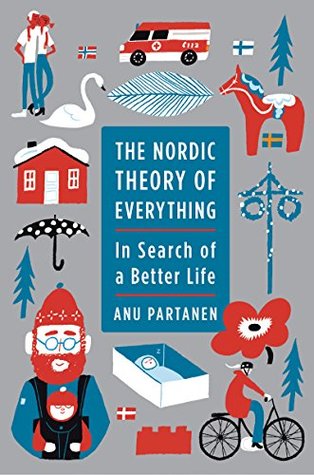More on this book
Community
Kindle Notes & Highlights
the United States still does not have a universal public health-care system. It’s simply unimaginable to them that an advanced rich country could be so backward.
A study by Save the Children deemed Nordic nations the world’s best countries for mothers, while the United States came in thirty-third. How is that possible? It’s possible because freeing people from the shackles of financial and other sorts of dependency on one another enables them to be more caring toward each other, not less. This is precisely the Nordic theory of love in action.
The ideal family is made up of adults who work and are not financially dependent on the other, and children who are encouraged to be as independent as early as possible. Rather than undermining ‘family values’ this could be interpreted as a modernization of the family as a social institution.”
Today the United States is at once a hypermodern society in its embrace of the contemporary free-market system, but an antiquarian society in leaving it to families and other community institutions to address the problems the system creates.
Brooks paints a picture of an America that allows “the ambitious and the gifted to surf through amazing possibilities,” but where the people who lack these skills fall further behind.
When it comes to “the ambitious and the gifted,” we need to add that for the most part, it’s only the ambitious and gifted lucky enough to have access to substantial private resources who find opportunity in America today.
Finland and its Nordic neighbors have found a way to expand personal liberty while also ensuring that the vast majority of individuals—not just the elite—have new ways to be stable and be able to prosper.
Good quality of life, worker satisfaction and health, economic dynamism, and political freedom and stability are all interconnected.
The small businesses that Americans applaud as the backbone of the U.S. economy have a darker side: the utter lack of any security for their employees. Technically companies are not allowed to fire someone for getting pregnant. The truth, however, is that it happens all the time.
only two did not guarantee any paid maternity leave; Papua New Guinea and the United States.
don’t guarantee their workers any paid time off for illness—others include Angola, India, and Liberia.
As wealthy, modern, industrialized nations, the Nordic countries have realized that the productivity of their workers and businesses, as well as the long-term health of their societies and economies, depends first and foremost on healthy relationships between children and their parents, between spouses, and between parents and their employers.
Nordic nations have realized that it is in the best long-term interests of everyone, including businesses, to support families in raising children. After all, in the long run, happy family members are more productive, and businesses will have a wider pool of healthy, productive, well-adjusted workers to draw on in the future. So when it comes to granting parental leave after a baby is born, the Nordic approach is also quite different from the American.
Parental leave policy is not dependent on the whims of different employers of different sizes, or on the vagaries of different local arrangements.
Nordic parental leaves are a function of a simple, straightforward, uniform national policy, and pay is furnished through taxes managed by each country’s social security system.
To make things fair, Nordic parental leaves are funded by all employees and employers, not just the firms that happen to have hired pregn...
This highlight has been truncated due to consecutive passage length restrictions.


